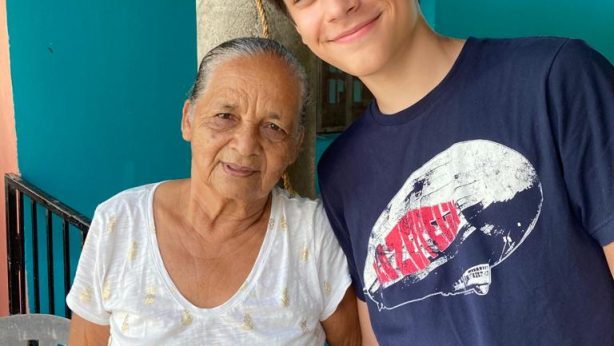Gloria’s Story: Breaking the Cycle of Intergenerational Poverty with a New Business
“If we had more money, I would fix up the house. We don’t have enough bedrooms and the [bedroom] walls are made of cardboard.”
As her business expands, Gloria’s priorities will be investing in her home and children.
Rushing me over to her house next-door to her assembly to chat more privately, Gloria explains, “We are very satisfied to have this opportunity with Adelante Foundation because before, we didn’t have the means to work.” Once at her house, Gloria showed me around – the kitchen area made of scrap metal, the makeshift latrine, and the one bedroom which has been divided by scraps of cardboard. She spoke to me about her plans, her struggles and how she joined Adelante in the first place.
Meeting new clients has become one of my favorite aspects of going to the field. The women who are more eager to speak with me are usually the ones who have been with Adelante for a longer period. They are proud to show off their hard-earned achievements and have become more confident over time. But by visiting a brand new assembly where everyone is still starting out with their businesses, I had the privilege of meeting Gloria.
The mother of seven, she tells a story of intergenerational poverty that has kept her and her family back for years. She also brings us back to the roots of how microfinance plays such a key role in empowering women living in poverty. In a rural community in the department of Atlántida, Gloria has struggled to get by day to day, week to week. Owning a business was not an option she had considered before because she never had enough money at one time to invest in any type of entrepreneurial activity.
Prior to starting with Adelante Gloria did what she could to support her husband’s income as a day laborer in the nearby fields. She washed clothes, washed dishes, and cleaned homes, but it was never enough to properly support her family or household. With $160, she invested in clothing to resell, and within a few months began making food to sell for additional income. Speaking for her fellow assembly members she explains, “What is lent to us isn’t much but it is enough to start working, and that is what makes us proud.”
Gloria recognizes the hard work and challenges that go into running her business. None of her children have graduated high school but she now has hope that the ones still at home will return to school. While discussing her own childhood, she confesses that her father wasn’t able to keep her in school after primary but is quick to add that this has nothing to do with how her family values education. Like her father, she has every intention of providing her children with the opportunities they desire. Her newfound pride stems from the fact that her new business has the potential to make this possible.


